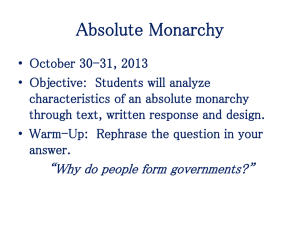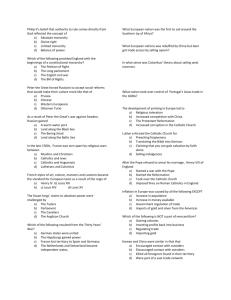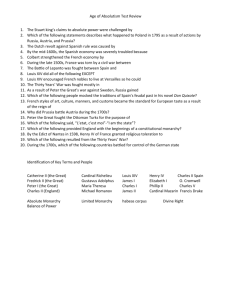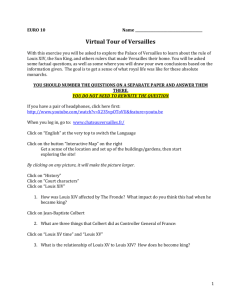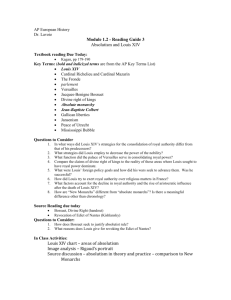Louis XV & Decline of French Monarchy: Mismanagement & Despotism
advertisement
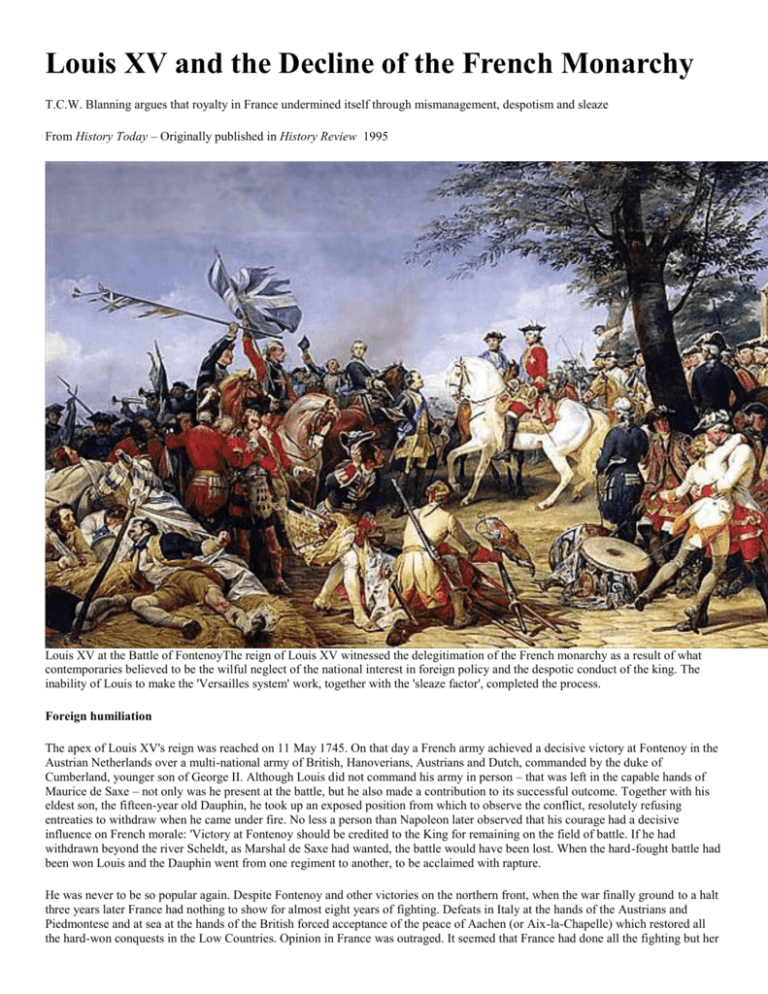
Louis XV and the Decline of the French Monarchy
T.C.W. Blanning argues that royalty in France undermined itself through mismanagement, despotism and sleaze
From History Today – Originally published in History Review 1995
Louis XV at the Battle of FontenoyThe reign of Louis XV witnessed the delegitimation of the French monarchy as a result of what
contemporaries believed to be the wilful neglect of the national interest in foreign policy and the despotic conduct of the king. The
inability of Louis to make the 'Versailles system' work, together with the 'sleaze factor', completed the process.
Foreign humiliation
The apex of Louis XV's reign was reached on 11 May 1745. On that day a French army achieved a decisive victory at Fontenoy in the
Austrian Netherlands over a multi-national army of British, Hanoverians, Austrians and Dutch, commanded by the duke of
Cumberland, younger son of George II. Although Louis did not command his army in person – that was left in the capable hands of
Maurice de Saxe – not only was he present at the battle, but he also made a contribution to its successful outcome. Together with his
eldest son, the fifteen-year old Dauphin, he took up an exposed position from which to observe the conflict, resolutely refusing
entreaties to withdraw when he came under fire. No less a person than Napoleon later observed that his courage had a decisive
influence on French morale: 'Victory at Fontenoy should be credited to the King for remaining on the field of battle. If he had
withdrawn beyond the river Scheldt, as Marshal de Saxe had wanted, the battle would have been lost. When the hard-fought battle had
been won Louis and the Dauphin went from one regiment to another, to be acclaimed with rapture.
He was never to be so popular again. Despite Fontenoy and other victories on the northern front, when the war finally ground to a halt
three years later France had nothing to show for almost eight years of fighting. Defeats in Italy at the hands of the Austrians and
Piedmontese and at sea at the hands of the British forced acceptance of the peace of Aachen (or Aix-la-Chapelle) which restored all
the hard-won conquests in the Low Countries. Opinion in France was outraged. It seemed that France had done all the fighting but her
allies, most notably the Spanish Bourbons, had received all the benefits. A topical simile entered everyday speech – 'as stupid as the
peace' (bete comme la paix).
This was nothing compared with the storm of disapproval which greeted the outcome of the next war of Louis XV's reign – the Seven
Years War (1756-63). With the advantage of hindsight, we can see that this was a truly 'world-historical' conflict, for by destroying the
burgeoning French empire in North America it decided that in the long run the world would become Anglophone. If contemporaries
did not grasp that momentous implication, they could certainly appreciate that France’s position in Europe and the world was at stake.
Perhaps even more painful than the multiple defeats by the British in Canada, the Caribbean, India and on the high seas was the
catastrophe suffered at the hands of Frederick the Great at Rossbach on 5 November 1757. Not for the first time, a French army went
east to chastise an upstart German prince, but this time it was routed – in the space of half-an-hour and by a Prussian army half its own
size. A story was soon making the rounds that, on the eve of the battle, French officers had observed loftily that they were doing 'great
honour' to the 'margrave of Brandenburg' by condescending to fight him. So Voltaire was not alone in thinking that Rossbach
represented a greater humiliation for his country than Crecy, Poitiers or Agincourt.
From the point of view of the stability of the French monarchy, the most serious aspect of the Seven Years War was the manner in
which it had begun. The treaty of Versailles of 1 May 1756 concluded an alliance between France and the Habsburg Monarchy and set
in motion a sequence of events which was to end in Frederick the Great's preemptive invasion of Silesia in August of the same year.
By bringing to an abrupt end two-and-a-half centuries of conflict between the two countries, it carried out a veritable 'diplomatic
revolution' in the European states-system. So sudden a rupture of tradition was bound to arouse bitter hostility. The new system might
just have won acceptance if it had been followed by a successful war in which France established control of the world overseas while
retaining her domination of the European continent. In the event, the military and naval disasters convinced French public opinion that
the country's foreign policy was fundamentally at odds with its real interests.
This was the responsibility of Louis XV. Although he had reservations about certain aspects of the new policy (especially the
implications for France's traditional allies in eastern Europe), he remained true to it until the end of his days. It was his desire to
perpetuate the alliance which prompted him to marry the Dauphin (the future Louis XVI) to the Austrian arch-duchess Marie
Antoinette in 1770. This change of' direction was possibly fatal for the French monarchy, for it convinced contemporaries that the
sharp decline in their country's power and prestige was due to the fundamentally misguided policies being pursued by the king and his
ministers. Yet the assertion of the country's position in the world at large was at the heart of kingship. If the king willfully ignored the
national interest, with disastrous consequences, then the king's very position was called into question. As one observer remarked, the
treaty of Versailles was 'the disgrace of Louis XV' which 'transformed France from being a great and victorious power into being the
auxiliary of Austria'. The war declared on Austria by the French Revolutionaries on 20 April 1792 in part represented the desire for
revenge.
Despotism
The other main attribute of' kingship was justice. In an age which seeks safeguards against tyranny in representative constitutions and
democratic institutions, it is difficult for us to appreciate just how much importance was attached to the rule of law. It was held to be
what distinguished the civilized countries of western Europe from 'oriental despotisms' such as Russia and the Ottoman Empire, whose
wretched inhabitants were subject to the arbitrary caprice of their rulers. The King of France may have been the sole legislator, but he
was as much subject to the law of the land as anyone else. His theoretical legislative monopoly was limited by the 'fundamental laws'
(lois fondamentales) of the kingdom, which governed the all-important question of royal succession and royal possessions, and by the
'maxims of the kingdom' (maximes du royaume), a package of traditions, conventions and principles none the less binding for not
being codified'.
It proved to be deeply damaging for the French monarchy that during the reign of Louis XV a dispute developed which led many
contemporaries to conclude that France was degenerating into a despotism. The main point at issue was 'Jansenism', which took its
name from Cornelius Jansen (1585-1638), bishop of Ypres in what was then the Spanish Netherlands. His exposition of the theology
of St Augustine, published posthumously in 1640, made a deep and lasting impact on all Catholic Europe. In France, however, the
movement which came to bear his name had political overtones from the start, because Jansen had been critical of Cardinal Richelieu's
foreign policy and because many of his sup- porters took an active part on the side of the opposition in the Frondes, the French civil
wars of 1648-1653. Louis XIV referred to the Jansenists as 'republicans' and towards the end of his life launched a vigorous campaign
against them. In 1713 he obtained a papal bull – 'Unigenitus' – condemning Jansenism as heretical.
That the king of France should seek the assistance of the Pope in Rome to persecute a group of French men and women, who always
vehemently denied that they were heretics, was found deeply disturbing even by non-Jansenists. Defence of 'Gallican liberties' was
always calculated to strike a responsive chord. Their opposition found vital institutional support from the Parlements, many of whose
members were Jansenist sympathisers. Moreover, when Louis XIV died two years later, in 1715, the Parlements regained the right to
remonstrate before registering royal legislation which they had lost in 1673. So when the infant Louis XV came to the throne, trouble
was already brewing. Whatever the rights and wrongs of the theological dispute may have been, it was most unfortunate from a
political point of view that the opportunity was not taken to reverse Louis XIV's policy. Aided and abetted by Cardinal Fleury, his first
minister from 1726 until 1743, Louis XV continued the anti-Jansenist line.
In doing so, he wilfully discarded the most powerful card in the royal pack – the association of the monarchy with the defence of
national integrity. By perpetuating the unnatural alliance with Rome, he allowed the Parlements to pick up the nationalist card and
play it for all it was worth. The result was a series of bruising encounters between king and Parlements, as the latter repeatedly sprang
to the defence of the Jansenists. In this struggle, the Parlements developed two crucial weapons: promoting solidarity between all
thirteen of their number, so that they could not be played off against each other; and appealing to public opinion by printing and
publicising their remonstrances. The king and his advisers proved to be much less adaptable. Their increasingly strident declarations
of royal absolutism made them seem unresponsive, insensitive, dictatorial – in a word 'despotic'. A gulf began to open up between the
interest of the king and what was perceived to be the interest of the nation, a gulf enhanced of course by the disastrous foreign policy
described in the previous section. As J.S. Bromley has written: 'national sovereignty was the most dynamic concept that was
crystallised out of the parliamentary struggle...parliamentary Jansenism, and with it what d'Argenson called Jansenist nationalism, did
more to shake the fabric of French absolutism, in its theory and its practice, than the philosophers.'
The expulsion from France in 1764 of the Jesuits, the arch-enemies of the Jansenists, seemed to symbolise the victory of the
Parlements. In 1771, however, Louis XV took advantage of a long-running secular dispute over the conduct of the royal governor of
Brittany, the duc d'Aiguillon, to abolish the Parlements altogether and to replace them with a new judicial structure more directly
under royal control. For most contemporaries, this intervention confirmed their growing suspicion that the French monarchy was
turning into a despotism. If the Parlements could no longer defend the national interest and national liberties against encroachment, a
sterner remedy would be needed. So not the least alarming feature of the uproar caused by the 'Maupeou revolution' (named after the
minister in charge of the coup against the Parlements) was the increasingly numerous and insistent calls for the summoning of the
Estates General, last convened in 1614. When Louis XV died suddenly from smallpox in 1774, his successor could recall the
Parlements. But he could not repair the fissures in the delicate fabric of trust in the monarchy rent by his grandfather's long and
unhappy reign.
Representational culture
At the great palace of Versailles Louis XIV had created a monarchical culture, which established a European standard. Every branch
of' the arts was enlisted to create an image of majesty which was both distanced from the ordinary observer and highly conspicuous.
This was not just a monarch ruling by divine right; it was also a monarchy legitimized by spectacle. As Peter Burke has written, Louis
XIV 'was charismatic in every sense – the original sense of having been anointed with chrism, a symbol of divine grace, as well as the
modern sense of a leader surrounded by an aura of authority'.' In its heyday, that is during the last quarter of the seventeenth century,
the Versailles system combined political authority with social control and European hegemony.
But even before Louis XIV's death, its glamour was beginning to fade. As his foreign policy went badly wrong in the War of the
Spanish Succession and death approached, the old king became increasingly morose and his court correspondingly gloomy. The
aristocratic world of fashion decamped for Paris, returning to Versailles only when unavoidable duty called. This cultural shift from
court to capital was symbolized by the decision of the duc d'’Orleans, who acted as regent for the infant Louis XV, to establish his
court at the Tuilleries palace in the centre of Paris. It is tempting but pointless to speculate what might have happened to the French
monarchy if it had stayed there. In 1722 the decision was taken to move back to Versailles, perhaps because the now adolescent king
had happy memories of his early childhood there, more likely because Orleans had been upset by his personal unpopularity with the
Parisians.
Back at Versailles, Louis proved to have many of the qualities necessary to operate successfully in a 'representational culture'
(representational in the sense that it relied on representing or making present the values of the regime). He was tall, strong, athletic,
good-looking and imposing. He was also intelligent, the most intelligent of all the Bourbons according to his most recent biographer.
Unfortunately, he also had a weak, high-pitched voice and was a very poor public speaker. Partly for that reason, he was also very
timid, secretive, elusive, indecisive and prone to long periods of complete silence. On the great stage built by his predecessor, he
appeared with growing reluctance and diminishing confidence. He kept the palace open to the public and continued to observe the
great royal festivals, but he appeared at the regular court functions ever more seldom. What he liked was to withdraw to his private
apartments (as opposed to the ceremonial state apartments), where he could relax with his intimate friends. Indeed, he began to spend
long periods away from Versailles altogether, preferring smaller secluded chateaux such as La Muette, Choisy and the Trianon. In
1750, for example, he spent only 52 nights at Versailles and only 63 the following year. But when he was absent, the court was dead.
Gradually, the system created by Louis XIV fell apart.
One of Louis XV's favorite private residences was the chateau of Choisy, which he had given to his most famous mistress, Madame de
Pompadour. Many French kings had maintained mistresses. Indeed, the most popular of all the Bourbons – Henry IV – had been a
fornicator on a legendary scale and Louis XIV had also fathered several illegitimate children. Sexual potency was and remains a
highly desirable attribute of kingship, as any anthropologist will confirm. So when the fifteen year-old Louis XV supplied his twentytwo year-old bride with 'seven tokens of his love' on their wedding-night (as the official report decorously put it) he was establishing
his credentials to be head of the herd in no uncertain fashion. Alas, what had been thought permissible in the past was increasingly
frowned on in the eighteenth century, often depicted as an age of sexual license hut in reality a distinctly priggish period.
Louis made matters much worse by the scale of his promiscuity. After he had debauched in turn three daughters of the marquis de
Nesle, the wags asked: 'To select an entire family – is that being unfaithful or constant?'
The 'sleaze' factor
If he had confined his attentions to the daughters of aristocrats, he would have caused less disapproval. In the event, he went ever
further down the social scale in his endless search for gratification. The marquise de Pompadour had been born plain 'Jeanne Poisson'
('poisson' means 'fish', which of course gave rise to some unpleasant metaphors), and her bourgeois origins were only accentuated by
her parvenu airs and graces. Worse was to come. At a house in Versailles known as the 'Parc aux Cerfs' (the deer-park) Louis
established what was in effect his private brothel, one of whose residents – Louise O' Murphy – was immortalized in Boucher's
celebrated painting Girl on a couch (also known as The sprawling O' Murphy). The titillating stories of scandalous orgies were
exaggerated if not untrue, but of course most people chose to believe that the king had sired ninety illegitimate children, that he bathed
in the blood of virgins, and so on. Louis' last official mistress – Madame du Barry – was also the most disreputable. If she had not
actually been a public prostitute, as the pornographic pamphlets maintained, her past had certainly been checkered, to put it mildly.
When Louis XV died, on 10 May 1774, the French monarchy was in dire straits. What seemed to be willful failure in foreign policy
and a despotic assault on the rule of law bad stripped it of its main sources of legitimacy. The reek of decadence, which hung about the
king's well-publicized 'private' life completed a bleak picture of decay not so very unfamiliar to us today. If the monarchy were to
survive, the next king would need to be able to reassert French power and prestige, regain a reputation for legality and reinvigorate
and modernize the monarchy's image. All that Louis XVI could bring to this task was an impeccable reputation for marital fidelity, so
impeccable indeed that he was commonly supposed to be impotent. Despite a brief moment of popularity when he restored the
Parlements and a fleeting revival of French power in the War of American Independence, it turned out that the legacy of his
grandfather was too crushing a burden for his broad but flabby shoulders.
Further reading
W Doyle, The Old European Order 1660-1800, Oxford 1978
D McKay & H Scott, The Rise of the Great Powers 1648-1815, Longman 1983
J Shennan, France Before the Revolution, Lancaster 2nd edn 1995
J Bromley, 'The decline of absolute monarchy' in J Wallace-Hadrill & J McManners France, Government and Society (eds),
London 2nd edn, 1985
D Echeverria, The Mapeou Revolution: A study in the history of libertarianism, France 1770-1774, Baton Rouge 1985
M Antoine, Louis XV, Fayard 1989
T.C.W. Blanning is a Fellow of Sidney Sussex College and the British Academy. His books include Joseph II and The French
Revolutionary Wars




